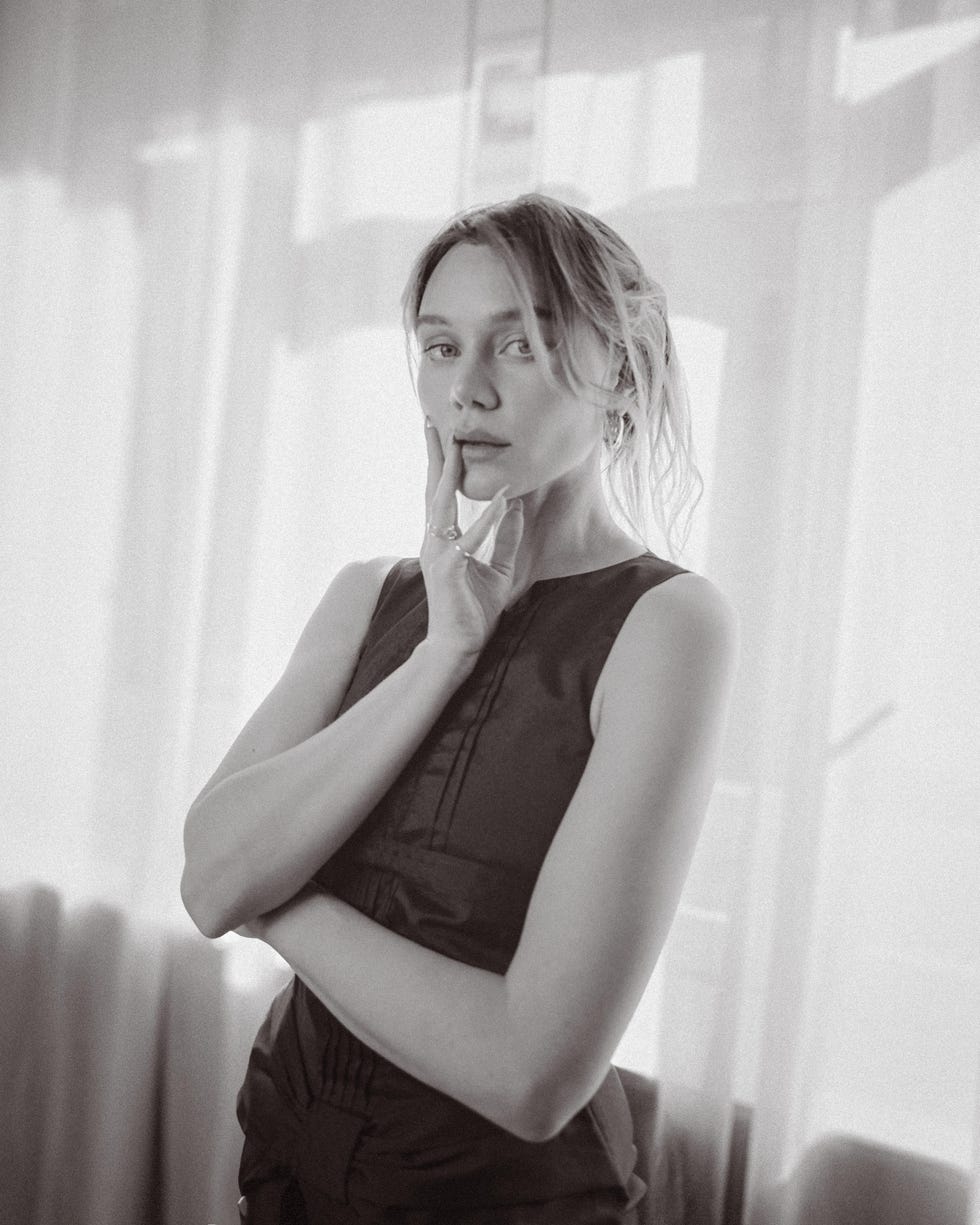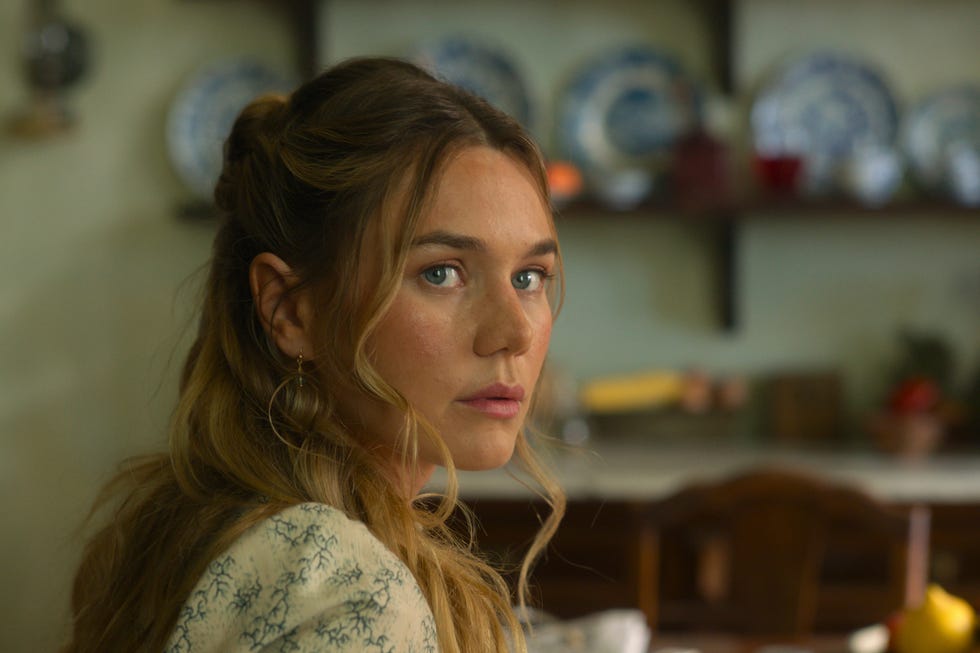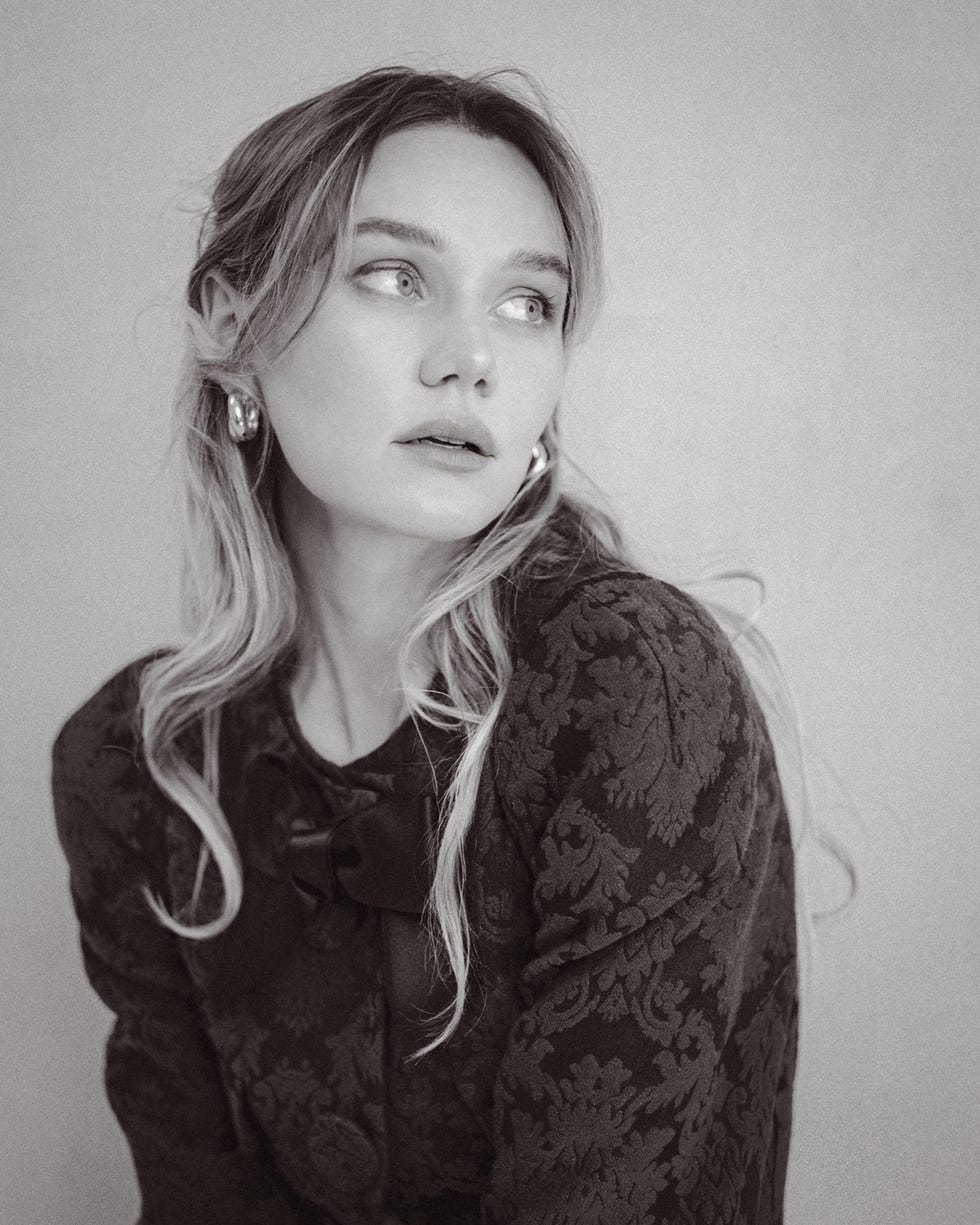Imogen Waterhouse Reflects on Jinny’s ‘Impactful’ Episode in <i>The Buccaneers</i>


Spoilers below.
From the beginning, the AppleTV+ period drama The Buccaneers, which follows a group of American women who arrive in England with plans to marry into British nobility, hasn’t shied away from depicting marital abuse and domestic violence via the relationship between Jinny St. George (Imogen Waterhouse) and Lord James Seadown (Barney Fishwick). Season 1 portrayed the ugly physical abuse Jinny endured, but it’s the sixth episode of the second season “Every Single Piece of My Heart,” that highlights the harrowing emotional consequences of their toxic relationship—especially in Victorian times.
After escaping from James in the season 1 finale, season 2 finds Jinny slowly allowing him back into her orbit. James tracks her and Guy (Matthew Broome) down in Italy and, over secretive meetings at his hotel, he butters her up with false promises about his changed behavior. Jinny is eager to believe him, both for the sake of her son Freddie as well as for her sister Nan (Kristine Froseth) and her true love Guy who sacrificed their future together to ensure Jinny’s safety. “She wasn’t the best sister in season 1, but I think now she’s realizing what a sacrifice Nan has made,” Waterhouse tells ELLE over a Zoom call. “[Reuniting with James] seems like the easy option. Obviously it’s not, but she thinks if this works out, then everything would work out.”
Jinny is this close to taking James back when Guy finds out and talks sense into her. They rush to gather their belongings to flee, but it’s too late—James kidnaps Freddie from under her nose in retaliation for her disobedience. “Every Single Piece of My Heart” is a distressing journey back to England for Jinny. With Nan’s help, she momentarily wins public opinion by having her side of the story published in the paper, but a confrontation with James at the opera lands her in a mental hospital. When James’s family finally gets involved, it’s too little too late; James is a loose cannon, and the episode culminates with him murdering his brother, Richard.
The emotional episode is a realistic depiction of abuse, which surprised even Waterhouse. “This is such an impactful way of showing the voicelessness of women, especially in this time,” she says. “It’s a fear of mine to have no one believe you or be sent somewhere and no one’s listening to you. I didn’t see it coming, but neither did Jinny.” Ahead, Waterhouse discusses the cycle of abuse Jinny finally escapes, what she’d say to fans who are upset with her character’s decisions, and what type of love interest she’d want for Jinny moving forward.
Why do you think Jinny’s story was important to tell, especially in this way?The writers made a big effort to write it realistically, and they did a lot of research into [abusive] relationships. It’s never just “you’re away from them so it’s over,” especially now that she’s tied to James with her baby. It’s hard to watch because as an audience you’re like, don’t go with him! But there’s so much at stake for her and there’s always this idea that, actually, maybe he has changed. Maybe things will be different. I think it’s important to show that it’s never as easy as walking away from someone.

Try not to judge her. It’s so easy to do as a viewer—I’d be like, what are you doing? But she is just hopeful that actually, this could work. She’s got a kid and she is without stability and her life is completely different. She’s in a completely isolated, ostracized place, and she’s very acutely aware that this experience in Italy can’t really last forever. Thinking about what’s next for her is really scary. So be patient with her.
The episode opens with Jinny trying to convince Guy that James has changed. Why do you think it took so long for her to realize that James was manipulating her?I found that scene quite hard to shoot because, in the space of a very short amount of time, she goes from one side, and then completely flips to the other side and has this moment of realization. We had to find exactly what it is about what Guy says that changes her mind.
The way I approached it was that Guy is now someone that she really, really trusts. There’s a lot that we don’t see of their relationship: He helped her through a traumatic birth, they’ve been through a lot together, and he is someone that really knows her now. He trusts her and she trusts him. She’s been seeing James secretly because she knows Guy is not gonna feel good about this. We’ve all done something that we failed to tell our friends about. Suddenly seeing it being voiced from someone else that she really loves, who also loves her and loves her baby—that’s what helps her be like, what am I doing?
Jinny is institutionalized by her husband who was trying to gaslight her about her experiences. How did you embody Jinny’s state of mind? Did you do any research about the history of women being called “hysterical”?In the Victorian times, women were lobotomized for being moody or “crazy.” It was a very real and scary idea of, if you go outside of the constraints of what it means to be a Victorian woman, you will face the repercussions for not doing much at all. I looked into that and even watched movies like Girl, Interrupted, which wasn’t even that long ago. Bearing all that in mind, and learning about some of the methods that they would use in those times, added this extra fear of, He could easily just say the word and this could happen. You lose your son and you lose yourself, and you’re locked up forever.

Jinny knows that the only way back to her son is to play this game and be like, I’m fine and I’ll do whatever you say. Otherwise, she’s not gonna get out of here. There was a fun scene where it was just me and our first camera operator, and we put heavy metal music on and I got to treat the room like a rage room and scream and shout. It was a release for me as an actor, but also for the character: Jinny lets these moments happen privately and then she knows that when a doctor is in the room she has to snap back and play this game. Women are so good at being able to put on a face publicly, but behind her closed doors, she’s completely unraveling.
How did you and Barney Fishwick prepare for this episode?We’ve been in this relationship since season 1, so we know the dynamic of Jinny and James really well, but it’s the first time where Jinny’s mentality is shifting. She is now seeing him completely differently and doesn’t love him anymore, and he hasn’t got her in a trap. We were always in conversation about what we were feeling in their relationship. Barney is so good at being so intensely horrible, it’s really helpful. The scenes aren’t fun to do—it’s actually horrible—but he’s a great team partner. And at the end of the day, it was important that we were able to laugh together.
Jinny’s main motivation is her son, which feels like a large step in maturation compared to where she was in season 1, when she turned a blind eye to James’s behavior with Lizzy and pursued him despite of it. How do you view her growth over the series thus far?She’s had such a crazy arc. She started as someone who was very goal-oriented and had been brought up in this way where she wasn’t going to stop at anything for what she wanted. She threw herself into this relationship that was obviously awful. Now we’re seeing her for the first time figure out who she is as a mother and as someone without her support system. We get to see a bit of her spark come back, a bit of her joy. Without sounding too cliche, in season 1 she’s a girl, and now she’s having to become a woman and figure out what that means.
How do you think James killing Richard will affect Jinny moving forward? Will she be able to forgive herself?She has even more guilt because she blames herself for the fact that James has murdered Richard. Conchita [Alisha Boe] and Richard have one of the most stable, lovely marriages in the whole show, which was quite refreshing. And now he’s dead. With that comes a whole new wave of really complex feelings. Jinny is free now, in a way, because James has gone to jail, but the cost of that is huge, and I think she will carry that with her forever.
I think forgiveness will be mirrored in Conchita: If Conchita forgives her, she might be able to [forgive herself]. But it’s still something that you carry with you.

Honestly, I was terrified that they were going to try and put Jinny with Guy. I don’t think Jinny could come back from that. She can come back from a secondhand murder, but I don’t think people would forgive her for that. Everyone always wants to assume that there’s something between people when, actually, a man and woman can coexist and have a friendship and co-parent. They have a huge respect for each other and I think she loves Guy a lot, but even Jinny would not go there.
Jinny is raising a son of her own. What lessons do you think she’ll impart with him, given the tragedy of his father?Given who the son’s father is, she’d really be trying to make him the opposite of that. I think she’d give him loads of love and tell him that he’s loved, and raise him to be a respectful man. It would give her purpose. She obviously wants this kid to not turn out like his father, and now she gets to go home and raise him with her village of women who are freer and loving and show affection.
Looking ahead, if the show gets picked up for a third season, Jinny might get a new love interest. What types of qualities do you think she needs in a partner?Everyone wants her to be gay. That’s what I’m seeing online, because she said she didn’t enjoy sex and because she and Lizzy had a cute friendship. In the show, truly anything can happen, so I won’t be that surprised. But I think she needs someone who’s not in high society. I don’t know why, but I see a gardener or someone that’s part of the earth. Someone who appreciates the small things and brings her down to earth would be good for her.
This interview has been edited and condensed for clarity.
elle


